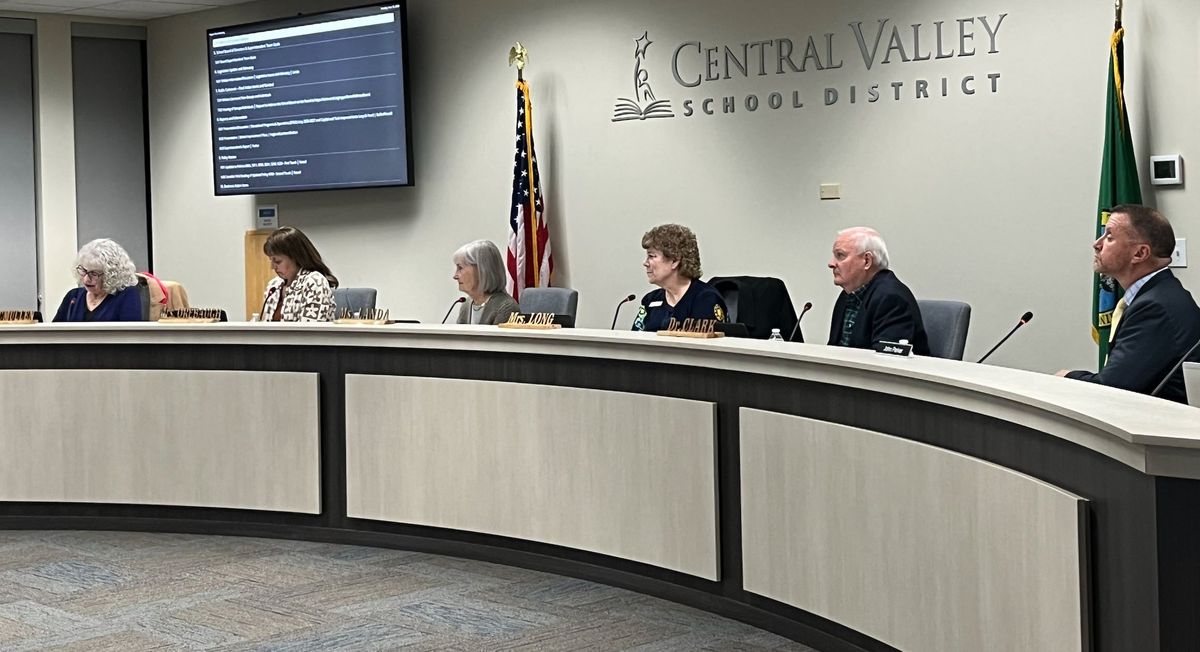Central Valley Schools sends two levies to February ballots

Central Valley School District voters have two big decisions to make in February.
The Central Valley School Board on Monday approved two levy resolutions: a $137 million educational programs and operations levy, and a $47.5 million capital levy, sending the tax proposals to residents’ ballots in February.
The school board unanimously approved sending the educational programs and operations levy to ballots, though board member Pam Orebaugh voted against a resolution for a smaller levy, favoring a cheaper proposal.
The educational programs and operations levy would renew at an estimated rate of $2.40 per $1,000 in assessed property value in the next three collection years, the capital levy 39 cents. Accounting for existing bond repayments – from both the 2015 and 2018 voter-approved bond measures – and both levies, the total rate of property taxes schools would collect would be $3.78 per $1,000 in taxable property value.
In 2023, property owners pay toward schools a rate of $2.99 per $1,000 in assessed property value.
Constituting 14% of the district’s general fund, the greater levy pays for everything beyond the state’s definition of basic education. This includes extra staff: teachers, administrators, support staff and supplemental special education services, as well as the entirety of the district’s extracurricular offerings.
“I would love to say they go to school for reading, writing or arithmetic,” school board member Debra Long said at her last board meeting on Monday. “But to get them through the door, I have choir, I have drama, I have band, I have football. Those are what enrich our children’s life. And we must do everything we can to enrich them and to provide them opportunities to be successful.”
The capital levy pays for facility improvements and technology upgrades. The two will be separate items on special election ballots.
Educational programs and operations levy
The total amount the district is seeking to collect under this levy is higher than in previous asks; voters approved $93 million in the last election cycle in 2021, split over three years.
The estimated rate that year was also $2.40 per $1,000 in assessed property value, though it ended up being less.
The state’s levy match funding has been decreasing in recent years, dwindling from over $8 million in 2020 to a projected $1.3 million this school year.
“That’s a huge difference that we need to find a source to fill, and the only source that we have available is the levy,” school board member Cindy McMullen said at the Nov. 13 board meeting. “That was money that was coming in; now the state’s not giving us that money.”
Expenditures are increasing districtwide, as operational costs in utilities, insurance and fuel are 39% higher in 2024 than in 2021. The district attributes these increases to inflation.
Additionally, new schools built under the 2018 bond – Ridgeline High School, opened 2021; Selkirk Middle School, opened 2019; and Horizon Middle School, opened 2020 – require staff to service these facilities, McMullen said.
“Expenditures have been astronomical,” said Gina Bullis, executive financial officer at the district. “If you have your revenue flatlining, but your expenditure is off the charts, you have to make up for that differential in the local levy dollars, otherwise your other option is to cut programs.”
Orebaugh said she supports the levy, but is concerned the price tag will be unappetizing to voters, who in the general election turned down a sales tax increase in Spokane County that would pay for a new jail.
“I don’t like the situation we’re in, honestly,” Orebaugh said at the Nov. 13 meeting. “With a lot of people in the community who are thinking, ‘I don’t know if I can buy medicine, I don’t know if I can buy food, I don’t know if I can buy gas,’ and we’re going to go ask them for money, that’s my quandary with this.”
Tim Barker, husband to recently elected school board member Anniece Barker, echoed these concerns at Monday’s meeting while addressing the board. He said he generally supported levies, but questioned the specific allocation of funds and disclosure to district residents.
“If it doesn’t pass, there will be cuts,” school board president Keith Clark said at his final meeting on Monday.
Capital levy
These levy funds would last the district six years. It is the district’s first time placing a capital levy on ballots.
In the proposed package, elementary schools of Adams, McDonald, Progress and University, and Bowdish and Greenacres middle schools, are slated for updates to create secure entrance vestibules, repairs to their roofs and upgrades to play structures. Broadway, Liberty Lake and South Pines elementary schools would get secure entrances and playground improvements. Summit School would get a secure entrance vestibule, playground improvements and ventilation updates. Spokane Valley Tech’s ventilation system would also get upgrades.
This collection of maintenance would total around $20 million from the capital levy.
The district allots $23.5 million under the plan for security infrastructure like cameras and alarms, replacing servers and routers, student Chromebooks and iPads, staff technology and the district’s phone system. Funding is also earmarked for paving and sidewalks, cafeteria tables and stadium lights.
Board members had their choice between three resolutions, with varying dollar amounts and differing allocations of funding.
Four of five board members opted for the most expensive of the three, which would pay for more than the cheapest resolution at $34 million. Orebaugh was alone in her vote against the resolution, preferring the cheaper option.
Jay Rowell, director of special projects, called the cheapest measure reactive rather than proactive, saying it risked higher replacement costs down the line.